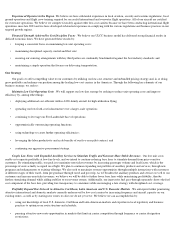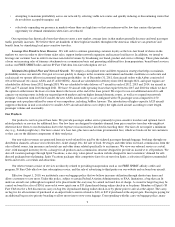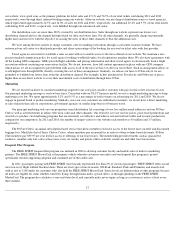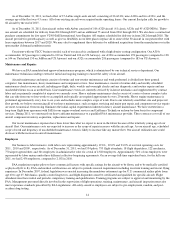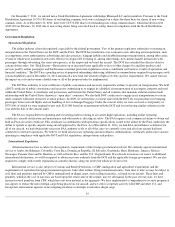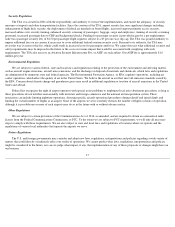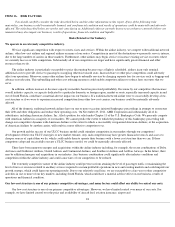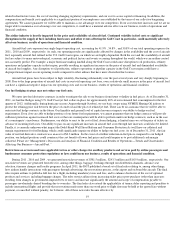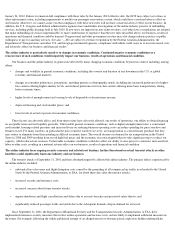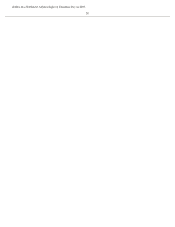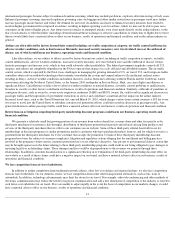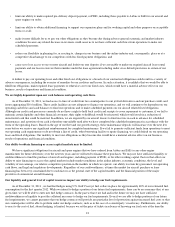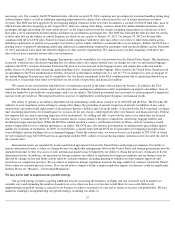Spirit Airlines 2011 Annual Report Download - page 20
Download and view the complete annual report
Please find page 20 of the 2011 Spirit Airlines annual report below. You can navigate through the pages in the report by either clicking on the pages listed below, or by using the keyword search tool below to find specific information within the annual report.
Security Regulation
The TSA was created in 2001 with the responsibility and authority to oversee the implementation, and ensure the adequacy, of security
measures at airports and other transportation facilities. Since the creation of the TSA, airport security has seen significant changes including
enhancement of flight deck security, the deployment of federal air marshals on board flights, increased airport perimeter access security,
increased airline crew security training, enhanced security screening of passengers, baggage, cargo and employees, training of security screening
personnel, increased passenger data to CBP and background checks. Funding for passenger security is provided in part by a per enplanement
ticket tax (passenger security fee) of $2.50 per passenger flight segment, subject to a $5 per one-way trip cap. The TSA was granted authority to
impose additional fees on air carriers if necessary to cover additional federal aviation security costs. Pursuant to its authority, the TSA may
revise the way it assesses this fee, which could result in increased costs for passengers and/or us. We cannot forecast what additional security and
safety requirements may be imposed in the future or the costs or revenue impact that would be associated with complying with such
requirements. The TSA also assesses an Aviation Security Infrastructure Fee, or ASIF, on each airline. Our ASIF fee is approximately $1.6
million per year.
Environmental Regulation
We are subject to various federal, state and local laws and regulations relating to the protection of the environment and affecting matters
such as aircraft engine emissions, aircraft noise emissions, and the discharge or disposal of materials and chemicals, which laws and regulations
are administered by numerous state and federal agencies. The Environmental Protection Agency, or EPA, regulates operations, including air
carrier operations, which affect the quality of air in the United States. We believe the aircraft in our fleet meet all emission standards issued by
the EPA. Concern about climate change and greenhouse gases may result in additional regulation or taxation of aircraft emissions in the United
States and abroad.
Federal law recognizes the right of airport operators with special noise problems to implement local noise abatement procedures so long as
those procedures do not interfere unreasonably with interstate and foreign commerce and the national air transportation system. These
restrictions can include limiting nighttime operations, directing specific aircraft operational procedures during takeoff and initial climb, and
limiting the overall number of flights at an airport. None of the airports we serve currently restricts the number of flights or hours of operation,
although it is possible one or more of such airports may do so in the future with or without advance notice.
Other Regulations
We are subject to certain provisions of the Communications Act of 1934, as amended, and are required to obtain an aeronautical radio
license from the Federal Communications Commission, or FCC. To the extent we are subject to FCC requirements, we will take all necessary
steps to comply with those requirements. We are also subject to state and local laws and regulations at locations where we operate and the
regulations of various local authorities that operate the airports we serve.
Future Regulations
The U.S. and foreign governments may consider and adopt new laws, regulations, interpretations and policies regarding a wide variety of
matters that could directly or indirectly affect our results of operations. We cannot predict what laws, regulations, interpretations and policies
might be considered in the future, nor can we judge what impact, if any, the implementation of any of these proposals or changes might have on
our business.
17


